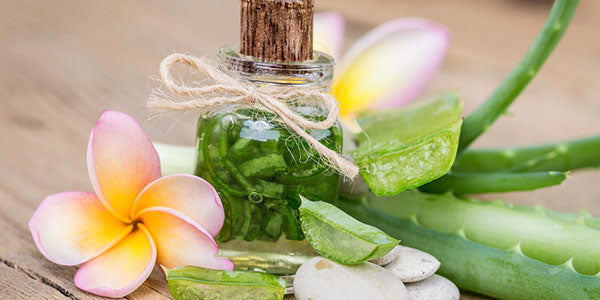
What is Aloe Juice?
First off, aloe vera is a succulent plant that traces back to early Egypt. In fact, aloe vera was depicted as the "plant of immortality" and suggested to be rejuvenating, healing, and soothing after topical application. However, aloe vera juice and water will not be found in the "summertime" store aisle. Instead, it can be found in a wide-variety of health stores in a drinking bottle and a little less goopy.
Aloe vera drinks are produced using the gel from the leaves. Water, juices, and milks are often used to cut the gel-like texture and to promote a more appealing mouth-feel. Since the ingredients are common household ingredients, people have started to create their own aloe vera concoctions in the comfort of their very own kitchen.
Nutritional Breakdown
With aloe being a plant, a noteworthy nutritional makeup would seem plausible. However, consuming the aloe leaves is remarkably different from a bowl of salad greens - the gel found inside the leaves is what's actually consumed. The gel is rich in nutrients including vitamins A, C, and E along with other B vitamins and minerals. In fact, aloe vera is one of the few plant products that contains vitamin B12, a vitamin primarily found in animal products. Aloe vera also provides amino acids, the building blocks of proteins that help support and repair muscle. Its notable nutrient content would seem to attribute to a wide variety of health benefits.
But What Does the Research Show?
People are drinking down aloe vera juice for a number of reasons - improve digestion, weight loss, promote healthy skin, the list continues. When jumping on any sort of new health trend, it is important to look into the research and potential side effects. The research on aloe is slightly limited yet compelling enough to spark interest. Topically, aloe vera is not associated with significant side effects. Orally, the results vary. A two-year study utilizing the whole leaf extract found in carcinogenic activity in rats. Although animal studies cannot be translated into conclusions based on humans, the National Toxicology Program suggests the data could be relevant to humans. Aloe vera also has a laxative effect which may result in abdominal cramps and diarrhea with heavy use.
Should You be Drinking Aloe Juice, Too?
Despite the lack of compelling evidence of aloe juice, its intake can be safe when consumed at a modest level. The nutritional profile of aloe vera is profound and features antioxidant and anti-inflammatory properties. When it comes to recommendation, the option is highly based on personal preference and interest. Some may not be able to overcome the texture while others may appreciate the uniqueness. Discussing with a healthcare professional can help further guide the intake of aloe.
References:
Aloe Vera. National Center for Complementary and Integrative Health. Available at: https://nccih.nih.gov/health/aloevera.







